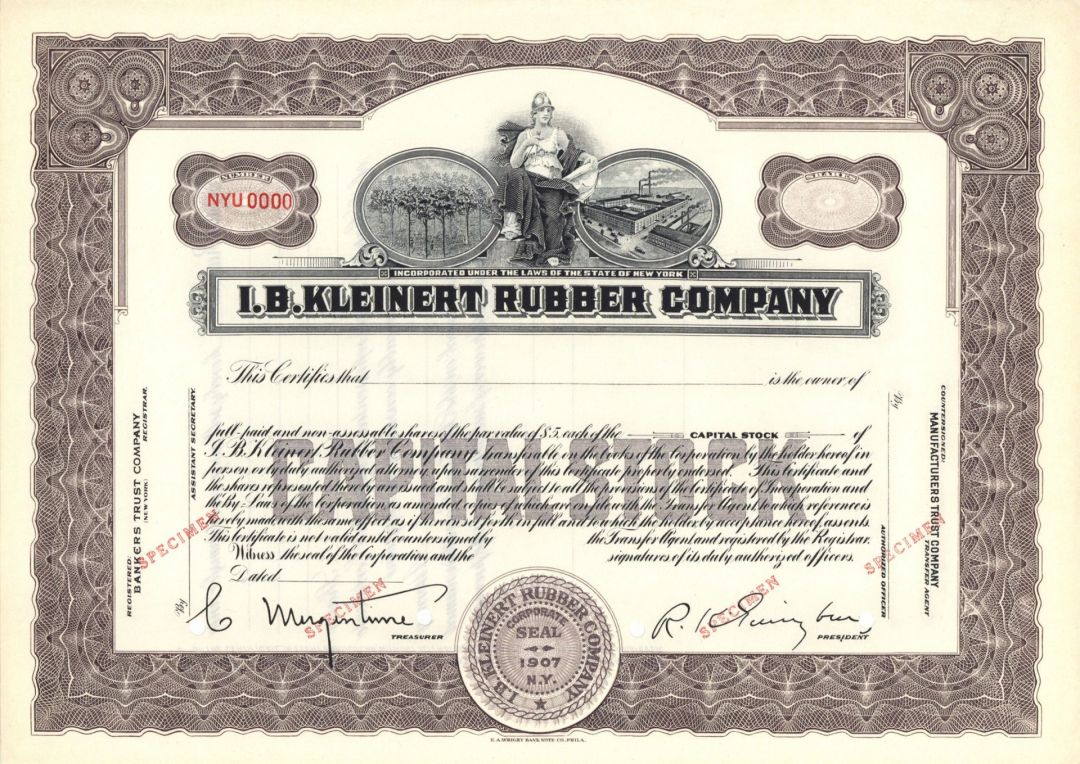I.B. Kleinert Rubber Co. - 1907 dated Specimen Stock Certificate
Inv# SE3973 Specimen StockSpecimen Stock printed by E.A. Wright Bank Note Co., Phila.
India Rubber was a manufacturer of hard rubber items, founded by local businessman and German-born industrialist Conrad Poppenhusen. Later, the building housed the Hard Rubber Comb Company and the I.B. Kleinert Rubber Company. A "ghost" sign reading "FACTORY A, I. B. KLEINERT RUBBER CO." can still be seen on the west side of the building. The building features 12-foot-tall ceilings and offers about 42,000 square feet of rentable industrial space. One of the current tenants is the Scarfand Co., a seller of ladies' scarves and other accessories. The first hard rubber goods factory in College Point was built by German immigrant businessman Conrad Poppenhusen in the mid-1850s. College Point was heavily dominated by industrial development by the last quarter of the nineteenth century and employed many German-Americans, Major employers were the Conrad Poppenhusen Enterprise Works, Hugo Funk Silk Mill, the Germania Ultra Marine Works, and the I.B. Kleinert Rubber Company. Isaak B. Kleinert founded the rubber company bearing his name in 1869 in College Point. The I.B. Kleinert Company received a number of patents for rubber items, including one in 1869 for dress shields for blocking underarm sweat. The company improved the product many times, including a patented "seamless stockinet" dress shield n 1894. Their trademarked label for a rubber dress shield in 1889 called "The Gem" was "nainsook covered" and made at their factory in College Point. They also manufactured corsets, brassieres, shower caps, and rubber pants for babies to wear over diapers. During World War II, the company made rubber life rafts for the U.S. military, for airmen who needed to ditch their planes into the ocean. The I.B. Kleinert Company offices were in Manhattan at 725 Broadway in 1902 when they filed plans with the city for a new rubber factory building elsewhere in Queens, which became known as "Factory F". The old street names adjacent to their older factory building ("Factory A") in this Clio description were 5th Ave. to the south (now 20th Ave.) and N. 18th St. to the west . By 1903, there were three buildings in the factory complex. The main factory building was mostly four-story, with a well and tank in the interior courtyard. A one-story brick building where oil was stored was to the northeast of the main building and west of the Long Island Rail Road corridor. To the east of the main building, west of the railroad corridor was a two-story brick structure with a one-story wooden north wing. The wing held a finishing shop; the second floor of the brick part of the structure including sleeping quarters for machinists. The brick portion of the structure is still standing but the wooden wing and oil storage shed are gone and replaced with a parking lot. Kleinert's is still a company, selling to stores and offering mail order to consumers; they incorporated as Hygienics Industries in 2003. They specialize in accessories to combat excessive sweating and incontinence. They still have a factory, but it is now located in Elba, Alabama.
Stock and Bond Specimens are made and usually retained by a printer as a record of the contract with a client, generally with manuscript contract notes such as the quantity printed. Specimens are sometimes produced for use by the printing company's sales team as examples of the firms products. These are usually marked "Specimen" and have no serial numbers.











Ebay ID: labarre_galleries